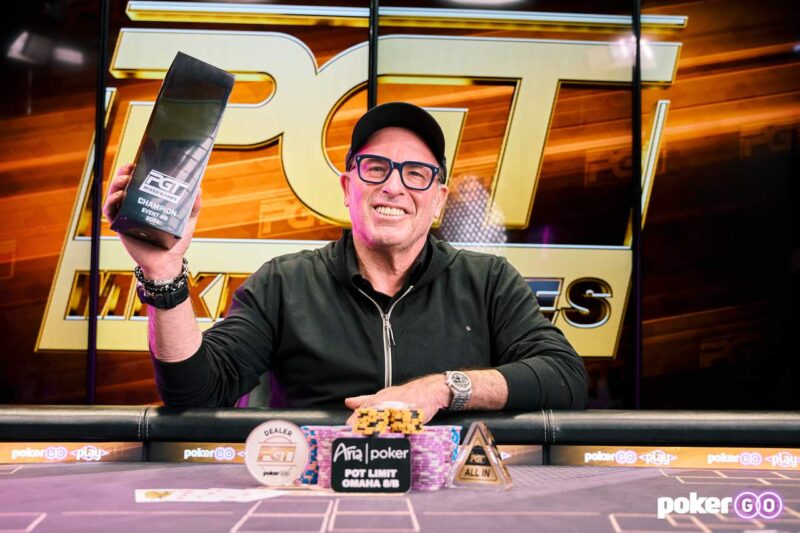Poker players are losers. Each and every one of us. Every session. Yes, you too!
Think I’m wrong? Do the math.

Look at your own experience the last time you played. You were probably dealt 30 or so hands an hour. If you’re even reasonably good, you discarded most of them before the flop. Of the ones you played, you folded at least a few on the flop or turn. If the hand went to showdown, you lost some and you won some. Add them all up, and you surely lost many more hands than you won.
Congratulations, you loser.
Short-Term Losses Key to Long-Term Success
If you’re a typical player, you lose at least 75% of the hands you’re dealt. It’s not because you’re bad. In fact, you must learn how to lose if you want to be an overall winning player.
You want to know how to spot the worst player in a poker game? Ask someone to point out the player who has won the most pots. The person who wins the most pots usually loses the most money in the long-run. It makes sense once you think about it, doesn’t it?
If you called every single hand until the river you would win more hands than anyone else. But, you’d lose the most money.
This is a tough lesson for some to learn. It is often a huge flaw you’ll find in the game of people who are — or were — competitive athletes. You know the famous line from the great football coach, Vince Lombardi? “Winners never quit and quitters never win.”
How about his “Show me a good loser and I’ll show you a loser!” This may be great advice for football players and other competitive athletes, but it’s poison for the skillful poker player.
Getting Beat Isn’t the Same as Losing
Poker players need to learn to lose correctly. You must be willing to fold and lose a hand, even when your competitive spirit makes it tempting to see the hand through to the end. Recognize that a strategic fold is just as important as a strategic bet or raise. If you can’t concede when you’re far behind, you will surely be an overall loser.
Here are three simple examples:
The Jerk
The table bully in this $1/$2 No-Limit game is an obnoxious loudmouth. He’s taunting everyone at the table. Whenever he’s the first one to enter the pot, he’s raising blind.
In this hand, you’re the big blind and he’s the button. It’s folded around to him, and he raises to $15 without looking at his cards. The small blind folds. You have J♥ 5♦. What do you do?
You want to teach this arrogant loudmouth a lesson. All of your competitive instincts tell you to stick around, at least for the flop, when you might hit a monster and stack this jerk. You don’t want to give him the satisfaction of stealing your blind. It would make you look pathetic. So, you’re inclined to raise, or at least call.
Even so, you should lose this hand. Folding is the best option. You have a subpar hand for heads up play, and you’re in one of only two spots where he’ll have position on you. Lose this hand and wait for another. Losing now is the winning play.
The Chaser
Here’s another example. You have rockets in late position. You raise, knocking out everyone but the button and the big blind who both call. You bet the flop of K♠ J♦ 2♠ and get called by both of your opponents. The turn is the 2♦.
You bet and they both tag along as well. Now comes the river: J♠, making the board K♠ J♦ 2♠ 2♦ J♠. The big blind, a guy you’ve never played with before, who checked to you on the flop, bets $75 into the $150 pot. You all have stacks of about $300. What do you do?
You want to stay in the game, not quit. You have a really good hand with aces up. If you fold to his bet you lose the hand – a hand you were likely leading with until the river. One bet of $75 is going to make you run away with your tail between your legs? What kind of a loser move would that be?
Even so, your best move is to lose – right away, without any further battle for the pot. Your opponent is making his bet from early position against two opponents. It’s unlikely a bluff. And if it’s not a bluff, then he’d either have to have hit his flush, trip Jacks or deuces, or maybe even a full house. There’s no way he’s value betting any hand worse than yours.
It’s not worth finding out. Admit defeat before seeing the showdown. Be a loser on this hand so you can be a winner overall.
Mr. Obvious
Finally, there’s this. You’re dealt Big Slick on the button. The hands progressed in such a way that you’re dead certain that your lone opponent has hit a straight on the turn. You, on the other hand, have the nut flush draw and there’s no pair on the board.
The pot is $400 and he bets $200. You have an effective stack of $300. You’re a warrior and are fairly sure that when you hit your flush, your opponent will call your shove on the river for another $100 just to see if you really made your hand. You hear the voice of your high school soccer coach telling you not to quit.
But if you’re to be a winning player in this game, you must concede. You’re not getting the right pot odds for your draw and, even if you add in your implied odds and count on the extra $100, you can’t quite justify the call.
And, truth be told, you have to discount that $100 extra that you think you’ll also win if you hit your hand because you’re not certain your opponent will call. No matter how you figure it, you just don’t have a good enough price to call.
When Losing is Winning
These three examples demonstrate the risks of carrying your competitive spirit from the gridiron to the felt. You must learn to replace the zeal for continued combat with a reasoned detachment that allows you to lose the hand in the interests of winning in the long run. And that’s not the only thing about losing you must learn.
You must also learn to absorb losses without having them negatively affect your game. This is hard for many people to do, as we’ve often been trained to get upset by losing. That anger and frustration is then used to fuel our future competitiveness and spur us on to better performance. This isn’t a good trait in poker.
Emotional involvement can tend to diminish your ability to play your best game. Unlike in physical sports, the rush of adrenaline and the presence of rage doesn’t typically propel poker players toward their best game, but instead, away from it. I’ve never seen a poker player, enraged by a string of losses, go on tilt, and have that push him into playing his best, thoughtful, careful, and strategic game.
To be a winner at poker, you must learn to separate the result of one hand from the play of the next.
Embrace the idea that strategic, short-term losses will lead to long-term success at the table. Learn to detach yourself from the loss of each hand, and focus on your goal of playing each hand correctly, not emotionally.
Then, after having folded most of your starting hands, after making good folds during the play of the hand, and after having squeezed the maximum amount of profit from the relatively few hands you took down in victory, you can say smugly to yourself, “Congratulations you loser.”


